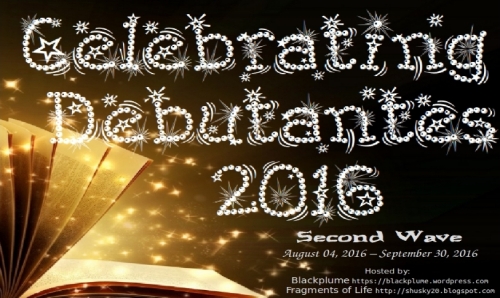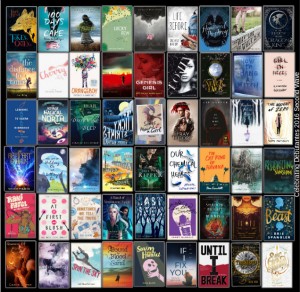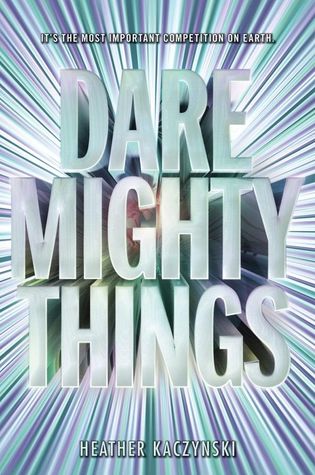
One of the perks of hosting a blog event like Celebrating Debutantes is the chance to work with talented authors. The chance to ask them questions and have a peek of their creative minds. Just like today, I got the chance to interview new author Wade Albert White about writing for middle grade readers and his upcoming book, The Adventurer’s Guide to Successful Escapes. This sci-fi, fantasy adventure will hit the shelves next week, September 13 and I am excited for every kids and kids at heart out there to experience an adventurous read.
I hope you guys enjoy the interview and be sure to check the bottom of the post for all the details about Wade Albert, The Adventurer’s Guide to Successful Escapes, and a fab giveaway!
Interview with Wade Albert White
Was The Adventurer’s Guide to Successful Escapes always for middle grade readers, or not? If so, why did you choose middle grade?
It was always intended for younger readers, yes, although in the first draft the main character was sixteen instead of thirteen, which would typically be considered more young adult than middle grade (going strictly by age, that is). As I revised the story and received feedback from various critique partners, however, I realized the overall voice and content were more middle grade in tone, and so adjusted accordingly.
I write for a younger audience because my kids are still young. I wanted to create something they could read and enjoy. Also, some of my favorite books have been middle grade books (Harry Potter anyone?). Plus, sometimes I tend towards the silly side, and that tends to be a good fit for middle grade as well.
Did you know right away that this was your story, or did you discover it as you wrote? How did the story evolve?
It started with the world. I knew I wanted to write a fantasy parody of sorts (although the book is definitely more than that), but I was also familiar with several such works and didn’t want to simply duplicate what was already out there. With that in mind, I thought it would be really interesting to write a story that mashed together fantasy with science fiction, and it took me a while to figure out how best to combine the two. In the end, I decided it would be fun to have a fantasy setting filled with magic and dragons and the like, but whose ancient history hinted at a society of science and technology (sort of the reverse of our world today).
Once I had those elements in place, I had to figure out what would be the most interesting story to tell in such a world. The answer, of course, was to send the characters on a hair-raising adventure that explored how their modern world of magic had evolved from an ancient world of science.
What is the best part of writing for middle grade readers?
I enjoy the enthusiasm of younger readers, whether it’s the jump up and down kind of excitement of some, or the quieter sit in the corner and smile of others. But when they love a thing, they tend to really, really love it.
I also enjoy the challenge of writing for that age group. They’re a sophisticated bunch, and can typically tell when they’re being pandered to, which keeps a writer on their toes. So you can be silly and playful, but the story still needs to mean something. The stakes need to be real for the characters, no matter how ridiculous the story gets.
What aspect of writing do you find most challenging, and why?
In terms of the process of writing, I have developed the ability to put myself in a chair and just write. I do sometimes, however, fall into the trap of spending too much time on smaller tasks that feel related to writing (such as organizing my bookshelf or cleaning my desk or checking out social media) but which are not the actual writing itself. These tasks make you feel like you’re getting stuff done, but the true work, the primary work, the writing, gets neglected. I think it happens most often when I’m feeling stuck, and by keeping busy with other things I trick myself into thinking I’m still moving forward. And don’t get me wrong: sometimes time away helps. No question. I do some of my best creative thinking while I’m washing the dishes or going for a run. But I’ve learned to see some of this other “busy work” for what it really is: a distraction. The writing should always come first.
In terms of actual content, I find my greatest challenge is conveying the emotions of characters—in my head I know what they’re feeling at any given moment, but as I write them it’s not always clear on the page. Of all the notes I receive from my editor, the item that recurs the most has to do with having the characters show a bit more emotion or reflect more on what’s happening to them.
Fantasy and science fiction are both exciting genres, you can create whole new worlds and defy common structures. For you, what’s the best part of writing in these genres?
I like both fantasy and science fiction because no matter what I think up, no matter what outlandish thought pops into my head, if I want to fit it into the story I can usually find a way to put it in there. So I can write a book that has robots fighting dragons and make it seem perfectly normal. Or I can include a wizard with a platypus for an arm. Or a holograph-like sparrow for a guide. As long as it all serves the needs of the story, I’m not constrained by any one particular view of reality.
Do you have a set of rules for your world? Is there a process you go through that helps define these?
There are rules, definitely, and I would argue that every story or world needs well defined ones. The primary rule for The Adventurer’s Guide series is that the world is run as a Bureaucracy. There are rules governing everything. That means paperwork or it didn’t happen. This sometimes (read: almost always) makes things more difficult, since often what should be a simple and straightforward task might be made infinitely more difficult because of some completely arbitrary rule. But the characters can use this to their advantage as well. It allows me to play with and even poke fun of a lot of common fantasy tropes.
Rules provide the parameters for the story and characters, and the parameters are what help the reader interpret the story in context (think of the rules as a container and the story the liquid you pour into it). That might at first blush seem contradictory to my answer in the previous question (that I like these genres because I can do whatever I want), but I think of it this way: I can make the rules whatever I want, but thereafter it’s important to make sure the story follows said rules.
What project are you working on or planning to write next?
I’m happy to say my next project is already well underway. I just finished the second draft of the sequel The Adventurer’s Guide to Dragons (And Why They Keep Biting Me), which is due out in the fall of 2017.
—
Thanks so much Wade for those wonderful answers. I had so much with this interview. Your answers are not just thoughtful but also a welcome reminders for beginners writer like me. I’m looking forward for the release of The Adventurer’s Guide to Successful Escape in few days. And have fun writing the sequel, The Adventurer’s Guide to Dragons (And Why They Keep Biting Me).
ABOUT THE AUTHOR
 Wade hails from Nova Scotia, Canada, land of wild blueberries and Duck Tolling Retrievers. He teaches part-time, dabbles in animation, and spends the rest of his time as a stay-at-home dad. It is also possible he has set a new record as the slowest 10K runner. Ever. He owns one pretend cat and one real one, and they get along fabulously.
Wade hails from Nova Scotia, Canada, land of wild blueberries and Duck Tolling Retrievers. He teaches part-time, dabbles in animation, and spends the rest of his time as a stay-at-home dad. It is also possible he has set a new record as the slowest 10K runner. Ever. He owns one pretend cat and one real one, and they get along fabulously.
Find Wade
Website | Facebook | Instagram | Twitter | Tumblr | Goodreads
ABOUT THE BOOK
Book Details:
 Title: The Adventurer’s Guide to Successful Escape
Title: The Adventurer’s Guide to Successful Escape
Author: Wade Albert White
Publisher: Little, Brown Books for Young Readers
Publication Date: September 13, 2016
Pages: 384
Format: Hardcover
A thrilling debut novel where fantasy and science fiction meet, dragons aren’t as innocent as they look (which is to say, not innocent at all), and nothing is quite what it seems.
Anne has spent most of her thirteen years dreaming of the day she and her best friend Penelope will finally leave Saint Lupin’s Institute for Perpetually Wicked and Hideously Unattractive Children. When the big day arrives, a series of very curious happenings lead to Anne being charged with an epic quest. Anne, Penelope, and new adventuring partner Hiro have only days to travel to strange new locales, solve myriad riddles, and triumph over monstrous foes–or face the horrible consequences.
Packed with action, humor, and endless heart, this debut novel marks the first volume in an irresistible and original fantasy series.
Book Links:
Amazon | B&N | BAM | BD | Goodreads | IndieBound | Powells
Giveaway:
What’s up for Grab?
- Personalized Signed Hardcover copy of The Adventurer’s Guide to Successful Escapes
The Rules:
- Open to US/CA only
- There will be one (1) winner
- Winner will be chosen and announced by rafflecopter
- Winner will be contacted thru email & should response within 48 hours
- Ends September 27th, 2016
- Prizes will be sent by the author
To enter fill out the rafflecopter form
Good Luck!!!
Treat yourself to a complete #CelebratingDebutantes2016 experience. Click the image below for the full list of schedule and links to each second wave feature post!




 Heather writes books for teenagers and other people who like books about teenagers. They’re usually about teenagers saving the world, because she really believes they can.
Heather writes books for teenagers and other people who like books about teenagers. They’re usually about teenagers saving the world, because she really believes they can. Title: Dare Mighty Things
Title: Dare Mighty Things

 Wade hails from Nova Scotia, Canada, land of wild blueberries and Duck Tolling Retrievers. He teaches part-time, dabbles in animation, and spends the rest of his time as a stay-at-home dad. It is also possible he has set a new record as the slowest 10K runner. Ever. He owns one pretend cat and one real one, and they get along fabulously.
Wade hails from Nova Scotia, Canada, land of wild blueberries and Duck Tolling Retrievers. He teaches part-time, dabbles in animation, and spends the rest of his time as a stay-at-home dad. It is also possible he has set a new record as the slowest 10K runner. Ever. He owns one pretend cat and one real one, and they get along fabulously.



